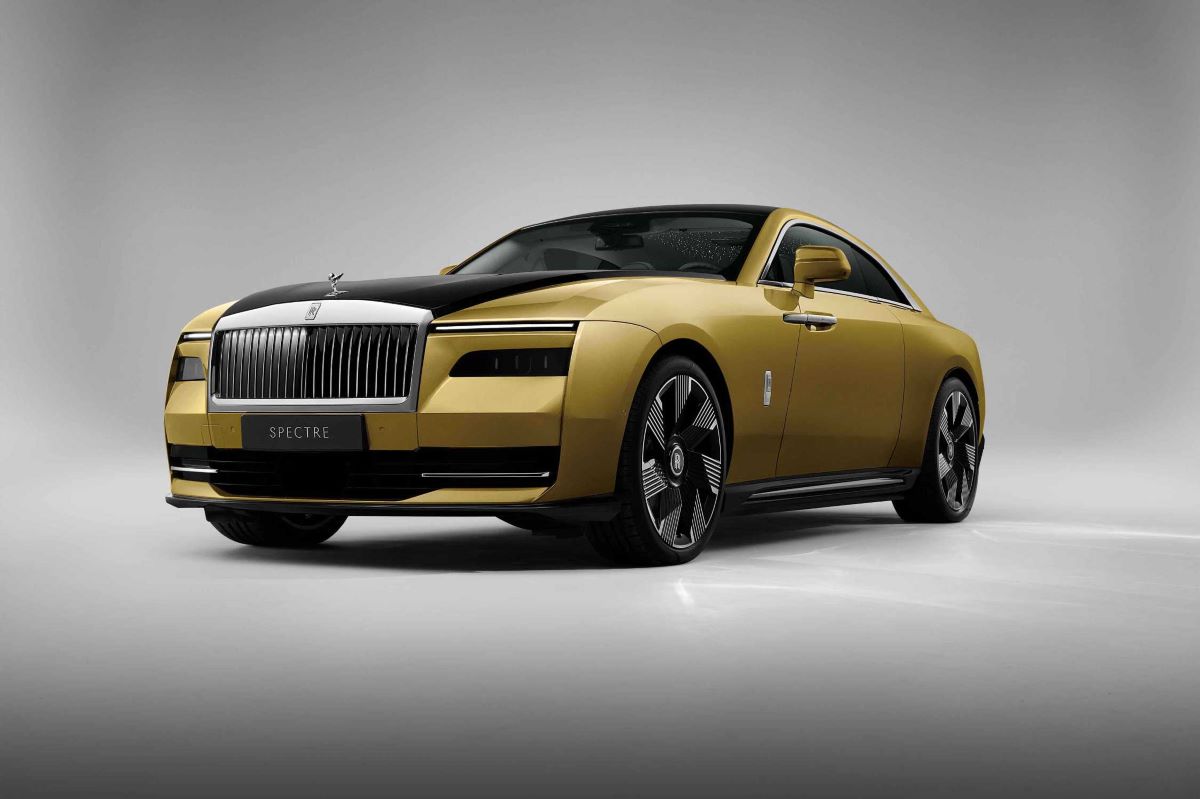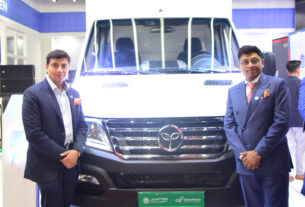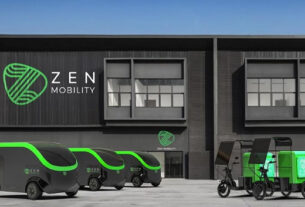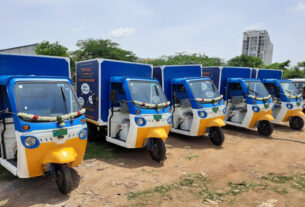“Spectre possesses all the qualities that have secured the Rolls-Royce legend. This incredible motor car, conceived from the very beginning as our first fully-electric model, is silent, powerful and demonstrates how perfectly Rolls-Royce is suited to electrification. Spectre’s all-electric powertrain will assure the marque’s sustained success and relevance while dramatically increasing the definition of each characteristic that makes a Rolls-Royce a Rolls-Royce. “At Rolls-Royce Motor Cars, perfection is about more than making the very best products. It is a culture, an attitude and our guiding philosophy. Indeed, it is our founding father Sir Henry Royce who said ‘strive for perfection in everything you do’. Spectre has been conceived within this culture. It is perfectly in tune with the sensibilities of our time. It states the direction for the future of our marque and perfectly answers a call from the most discerning individuals in the world to elevate the electric motor car experience, because Spectre is a Rolls-Royce first and an electric car second.
“This is the start of a bold new chapter for our marque, our extraordinary clients and the luxury industry. For this reason, I believe Spectre is the most perfect product that Rolls-Royce has ever produced.”
Torsten Müller-Ötvös, Chief Executive Officer, Rolls-Royce Motor Cars
“The electric car is perfectly noiseless and clean. There is no smell or vibration. They should become very useful when fixed charging stations can be arranged.”
The Hon. Charles Stewart Rolls, Co-Founder, Rolls-Royce, 1900
A PROPHECY FULFILLED. A PROMISE KEPT. AN EXTRAORDINARY UNDERTAKING.
In 1900, Rolls-Royce co-founder, Charles Rolls, prophesised an electric future for the motor car. Having acquired an electric vehicle named The Columbia Electric Carriage, he foresaw its suitability as a clean, noiseless alternative to the internal combustion engine – providing there was sufficient infrastructure to support it. Today, more than 120 years later, the time has come for Rolls-Royce Motor Cars to fulfil the prophecy of its founding father.
This prophecy could not have been fulfilled without a more recent promise, when Rolls-Royce CEO, Torsten Müller-Ötvös, made a public commitment to electrification by announcing that he would bring a fully-electric Rolls-Royce to market within the current decade. Charles Rolls’ prophecy and Torsten Müller-Ötvös’ promise led to an historic moment. In September 2021, the marque confirmed that it had commenced testing of Spectre, the first Rolls-Royce to be conceived and engineered from the very beginning as an electric car.

To ensure that this transformative motor car was sufficiently prepared for the most demanding consumer in the world – the Rolls-Royce client – the marque devised the most exhaustive testing programme it had ever conceived. Spectre is being subjected to a journey of more than 2.5 million kilometres, simulating more than 400 years of use for a Rolls-Royce. On its completion in 2023, Spectre will represent a prophecy fulfilled, a promise kept and an undertaking completed.
Spectre is not only an historic moment for Rolls-Royce, but also an historic moment for electrification – with Spectre, the marque confirms that the technology has reached a standard that can contain the Rolls-Royce experience. To that end, Rolls-Royce has confirmed that by 2030 its entire product portfolio will be fully electric.
THE FUTURE BEGINS
Spectre is more than a motor car. It is a statement of intent and a symbol of a bright, bold future as Rolls-Royce progresses into an all-electric era. This commitment to an all-electric powertrain will only enhance the Rolls-Royce experience – instant torque, silent running and the sense of one imperceptible gear have defined the characteristics of an extraordinary canon of products dating back to the very first Rolls-Royce, the 1904 10 H.P..
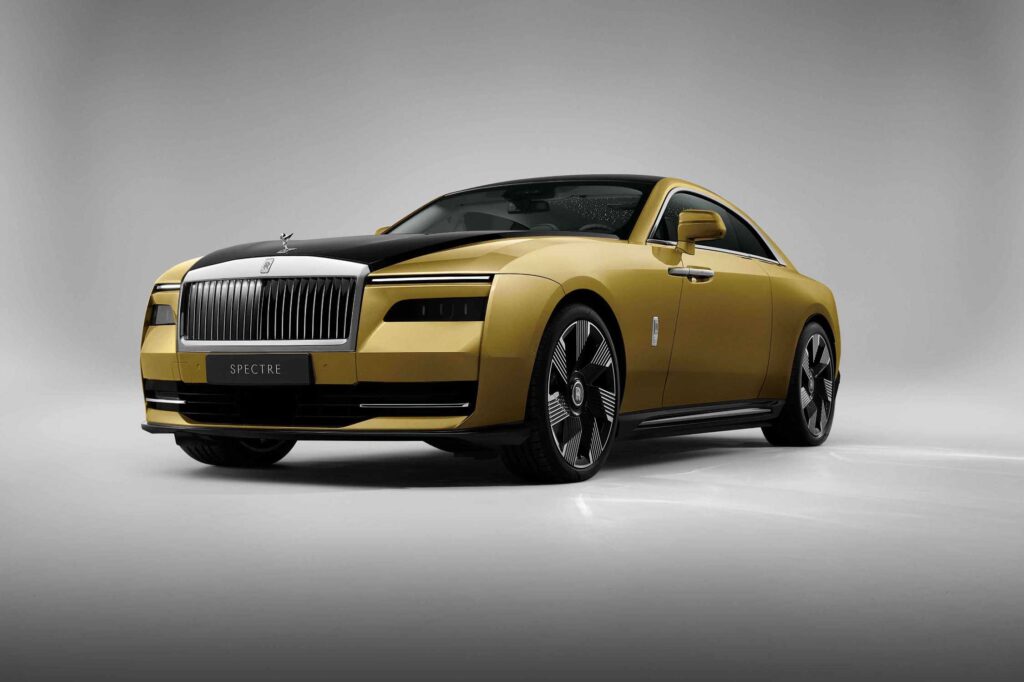
With Spectre, Rolls-Royce has harnessed a revolutionary ‘Decentralised Intelligence’ system that allows for the free and direct exchange of information between more than 1,000 vehicle functions, further elevating the marque’s celebrated quality of ride. Its designers have captured a contemporary yet timeless aesthetic that significantly progresses the brand’s iconography as it embarks on its electric age. Its craftspeople have created a suite of contemporary prêt-à-porter personalisation possibilities, including Starlight Doors and Illuminated Fascia, inspiring clients to realise their own Bespoke visions.
DESIGN
In unveiling Spectre, Rolls-Royce sets a new precedent in the creation of an entirely original class of motor car; the Ultra-Luxury Electric Super Coupé. This designation refers to Spectre’s indulgent proportions, specified in response to a commitment that there is no greater luxury than that of space.
The marque’s designers are deeply rooted in the context occupied by their motor cars. Therefore, their inspiration is drawn from worlds far beyond automotive, including haute couture, modernist sculpture, nautical design, tailoring and contemporary art. In conceiving the principal sketches for Spectre, the marque’s creatives were drawn to modern yacht concepts, specifically the clarity and precision of line, intelligent use of reflection and application of taper to emotionalise silhouettes.
From the front, Spectre’s split headlight treatment is intersected by the widest grille ever bestowed on a Rolls-Royce. The vanes of the Pantheon grille are now smoother in section and a flusher fit, designed to help guide the air around the motor car’s front.
The relaxed angle and polished stainless steel finish of the grille does much to enhance Spectre’s presence using environmental reflection. Along with an aero-tuned Spirit of Ecstasy figurine – itself the product of 830 combined hours of design modelling and wind tunnel testing – the grille enhances the motor car’s unprecedented drag coefficient, which at just 0.25 Cd makes Spectre Rolls-Royce’s most aerodynamic motor car, ever.
This intelligent treatment has been married to the iconography of Spectre’s spiritual successor, the Phantom Coupé. Spectre clearly acknowledges its forebear with its generous proportions and split headlight treatment – a contemporary Rolls-Royce design tenet. Spectre’s sharp daylight running lights emphasise the motor car’s imperious two-metre width and are offset with lower lamp clusters that appear darkened, at first glance, but hide jewellery box-like darkened chromium housings for the headlights. To affirm Spectre’s expression after dark, the grille is softly illuminated, with 22 LEDs lighting up the sandblasted rear side of each of the vanes, their gentle glow reflected in the polished front surfaces for a subtle and three-dimensional night signature.
In profile, the sharp, vertical bow line at the front of Spectre draws the eye rearward to its monolithic flanks. The lower line – known as the ‘waft line’ – borrows directly from yacht design. Instead of exaggerating movement with busy detailing or appliqués, Spectre’s coachwork gently tucks into the sill, lightening the surfacing and creating an uncomplicated sense of motion by reflecting the road passing beneath it, much as the hull of a racing yacht reflects the ocean as it cuts through water. This ‘waft line’ is the visual representation of the ‘magic carpet ride’ and its upwards sweep toward the front is inspired by the gently lifting bow of an accelerating power boat.
The silhouette’s most dramatic feature is Spectre’s fastback, which recalls the most evocative motor cars and watercraft in history. The seamlessness of the greenhouse surfacing significantly contributes to achieving the lowest drag coefficient ever for a Rolls-Royce. Following the roofline back, the tail lamps are set into the largest single body panel ever produced for a Rolls-Royce, which extends from the A-pillar to the luggage compartment. The jewel-like vertical tail lamps themselves are colourless for neutrality, in anticipation of the myriad of colourways selected by clients during the commissioning process. Their precision and reduced dimension complement the generous flow of the bodywork from the muscular shoulders backwards into the tail section with its characteristic tapering plan view.
The proportional demands of Spectre’s scale required Rolls-Royce to embolden its wheel strategy. Spectre is the first production two-door coupé to be equipped with 23-inch wheels in almost one hundred years.
Inside, Spectre is provisioned with the most technologically advanced Bespoke features yet, drawing inspiration from the timeless mystique of the night’s sky. For the first time on a series production Rolls-Royce, Spectre is available with Starlight Doors, which incorporate 4,796 softly illuminated ‘stars’. The coach doors can also be commissioned with a backdrop of wood Canadel Panelling, which takes its name from the cove in the South of France where Sir Henry Royce and his design team spent their winters.
The ethereal night-time theme continues with Spectre’s Illuminated Fascia. Developed over the course of two years and more than 10,000 collective hours, it incorporates the Spectre nameplate surrounded by a cluster of over 5,500 stars. Located on the passenger side of the dashboard, the illuminations are completely invisible when the motor car is not in operation.
Alongside the extraordinary, illuminated surfaces, Spectre is equipped with a completely redesigned digital architecture of luxury named SPIRIT, presented in quintessential Rolls-Royce style. Not only will SPIRIT manage the motor car’s functions, but it is seamlessly integrated into the marque’s Whispers application, allowing clients to interact with their car remotely, and receive live information curated by the marque’s luxury intelligence specialists.
For the first time ever, clients are now able to extend their Bespoke commission beyond the physical world and into the digital architecture that underpins SPIRIT. Inspired by the marque’s clients’ love of bespoke timepieces, the colour of the dials can now compliment the interior hue of the motor car.
As with all Rolls-Royce motor cars, Spectre’s interior suite offers clients near-infinite Bespoke possibilities. The all-new front seat design has been inspired by British tailoring, with lapel sections that can be rendered in contrasting or matching colours to the main base. Bespoke stitching, embroidery and intricate piping has, as ever, been considered in their inception.
ALL-ALUMINIUM ARCHITECTURE OF LUXURY
2003 saw the first Goodwood-era Phantom, built upon its own Bespoke architecture. This renaissance of the brand was Rolls-Royce 1.0. Following this, the ‘Architecture of Luxury’ was conceived – a new, highly flexible all-aluminium spaceframe architecture, and visionary feat of engineering, that could be tailored for electric drive, as well as today’s Phantom, Cullinan and Ghost models, and Coachbuild projects. This expansion of the marque’s offering was Rolls-Royce 2.0. The ability to tailor the Architecture of Luxury for electric drive was a fundamental consideration when it was first conceived. However, it is only now that electric drive technology is advanced enough to fulfil the Rolls-Royce experience. The introduction of a fully-electric powertrain and Decentralised Intelligence into the marque’s portfolio represents Rolls-Royce 3.0 and the beginning of the bold new all-electric era.
By ensuring from the outset that the Architecture of Luxury could be tailored to the requirements of an all-electric Rolls-Royce, the marque’s engineers ensured the continuity of experience from its current portfolio, each evolution of which has done much to secure the brand’s ongoing global success. Indeed, the inherent flexibility of the architecture and ease of integration of an electric powertrain has freed engineers, designers and craftspeople to focus on the quality of experience, authenticity of design and innovation in Bespoke.
For Spectre, Rolls-Royce engineers have unlocked further benefits. The sophisticated extruded aluminium sections and integration of the battery into the structure of the motor car enable it to be 30% stiffer than any previous Rolls-Royce. The flexibility of the architecture has also allowed engineers to place the floor halfway between the sill structures rather than on top or underneath them. A channel has been created for wiring and climate control pipework between the battery and the floor, with the battery mounted underneath, providing a perfectly smooth underfloor profile. This not only creates a low seating position and enveloping cabin but realises a secondary function for the battery – almost 700kg of sound deadening.
DIGITAL ENGINEERING
For Spectre, Rolls-Royce’s engineers have seen much of their discipline pivot from the workshop to the digital space. Spectre is the most connected Rolls-Royce in history, and in harnessing the power of the motor car’s remarkable Decentralised Intelligence processing capabilities there is more requirement than ever for expert human experience.
To ensure the continuity of the Rolls-Royce experience, as well as its progression, the marque selected the most experienced test and development engineers to lead the project, some of whom have been with the marque for more than two decades and were responsible for creating the first ‘Goodwood-era’ Phantom. These engineers describe the experience offered by Spectre as akin to “Rolls-Royce in high definition” on account of the speed and accuracy of the motor car’s response to a worldwide spread of road and weather conditions.
For this to be realised, a dedicated control has been handmade for each of the 141,200 sender-receiver variables, and in nearly all cases engineers have designed several more sub-variables for variations in climate, ground speed, road type, vehicle status and driving style. These have been crafted over the course of Spectre’s 2.5 million kilometre testing programme both on advanced proving grounds and on real roads around the world.
PLANAR SUSPENSION
In testing Spectre, the process includes extreme driving conditions – development of the motor car began just 55km from the arctic circle in Arjeplog, Sweden, at temperatures as low as -40 degrees centigrade, and it will continue across Southern Africa, in temperatures of up to 55 degrees centigrade. Yet, 55% of testing is taking place on the very roads that many production Spectres will be driven on. Of particular significance was the French Riviera. It was on the Côte d’Azur that Spectre’s digitally integrated evolution of the renowned Planar suspension system was finalised.
Planar suspension is an orchestra of systems with precisely defined responses to driver inputs and road conditions, made possible by the latest software and hardware developments, delivering Rolls-Royce’s hallmark ‘magic carpet ride’.
Using a suite of new hardware components and leveraging Spectre’s high-speed processing capabilities, the Planar system can decouple the car’s anti-roll bars allowing each wheel to act independently, preventing the rocking motion that occurs when one side of a vehicle hits an undulation in the road. This also reduces high-frequency ride imperfections caused by shortcomings in road surface quality.
Once a corner is identified as imminent, the Planar system recouples the components and stiffens the dampers, the four-wheel steering system is then prepared for activation to ensure effortless entry and exit. Under cornering, 18 sensors are monitored, and steering, braking, power delivery and suspension parameters are adjusted so that Spectre remains stable. The result is effortless control.
POWER, RANGE, AND DIMENSIONS
The final power, acceleration and range figures are still being refined, as the extraordinary undertaking of finessing Spectre enters its final phase before concluding in the second quarter of 2023. Preliminary data shows that Spectre is expected to have an all-electric range of 520 kilometres /320 miles WLTP and offer 900Nm of torque from its 430kW powertrain. It is anticipated to achieve 0-100km/h in 4.5 seconds. (0-60mph in 4.4 seconds).
With many months of testing and optimisation of Spectre still ahead, these figures are subject to change ahead of official confirmation prior to market launch in Q4 2023.


